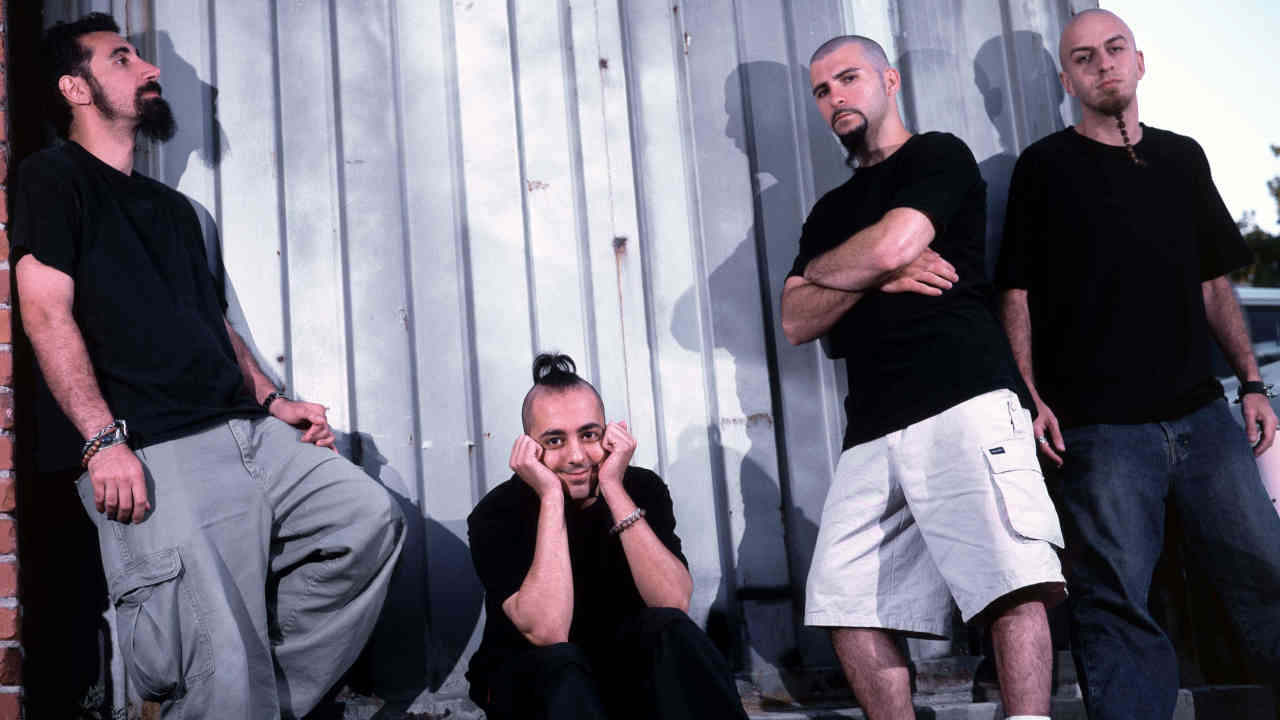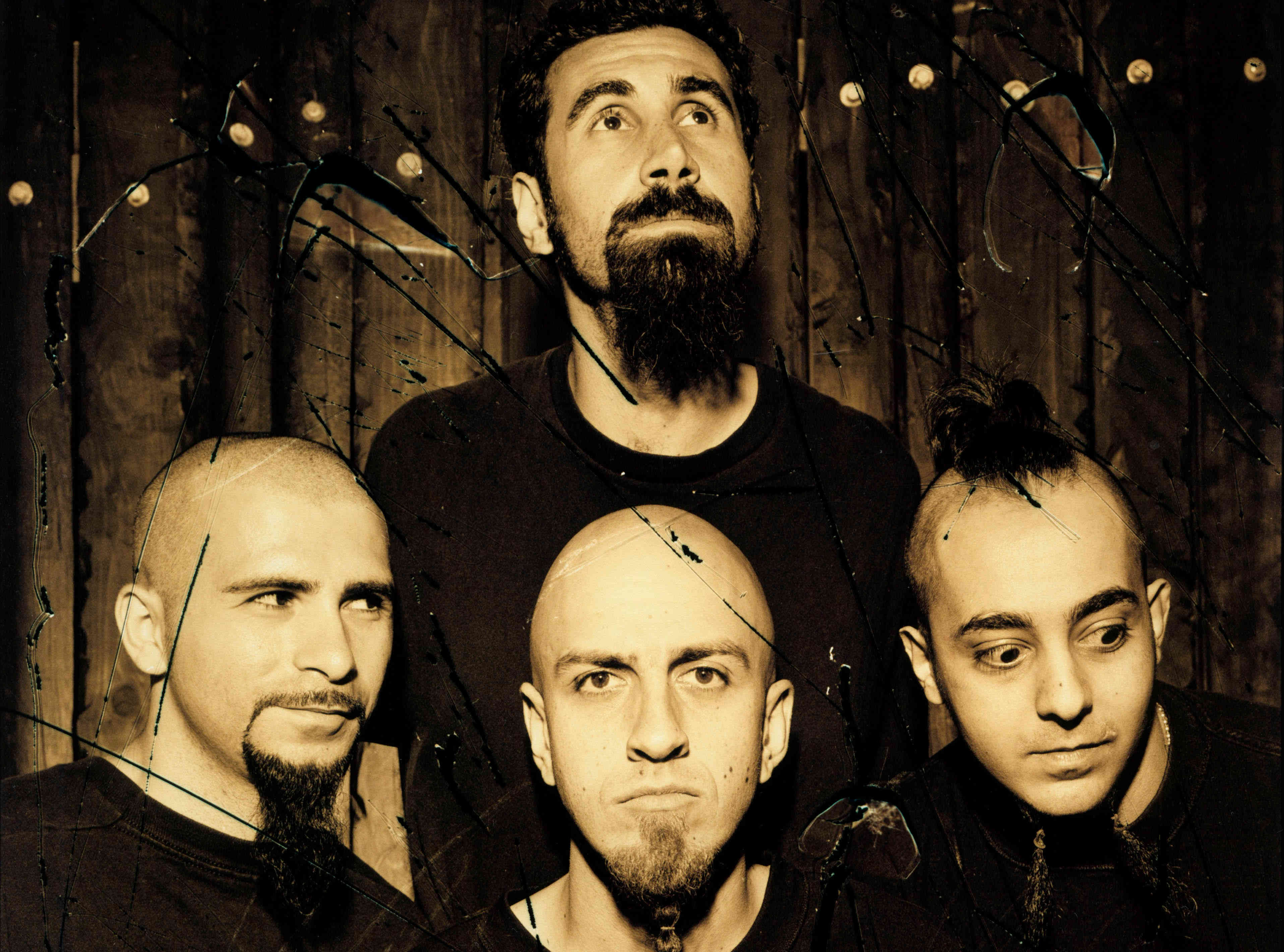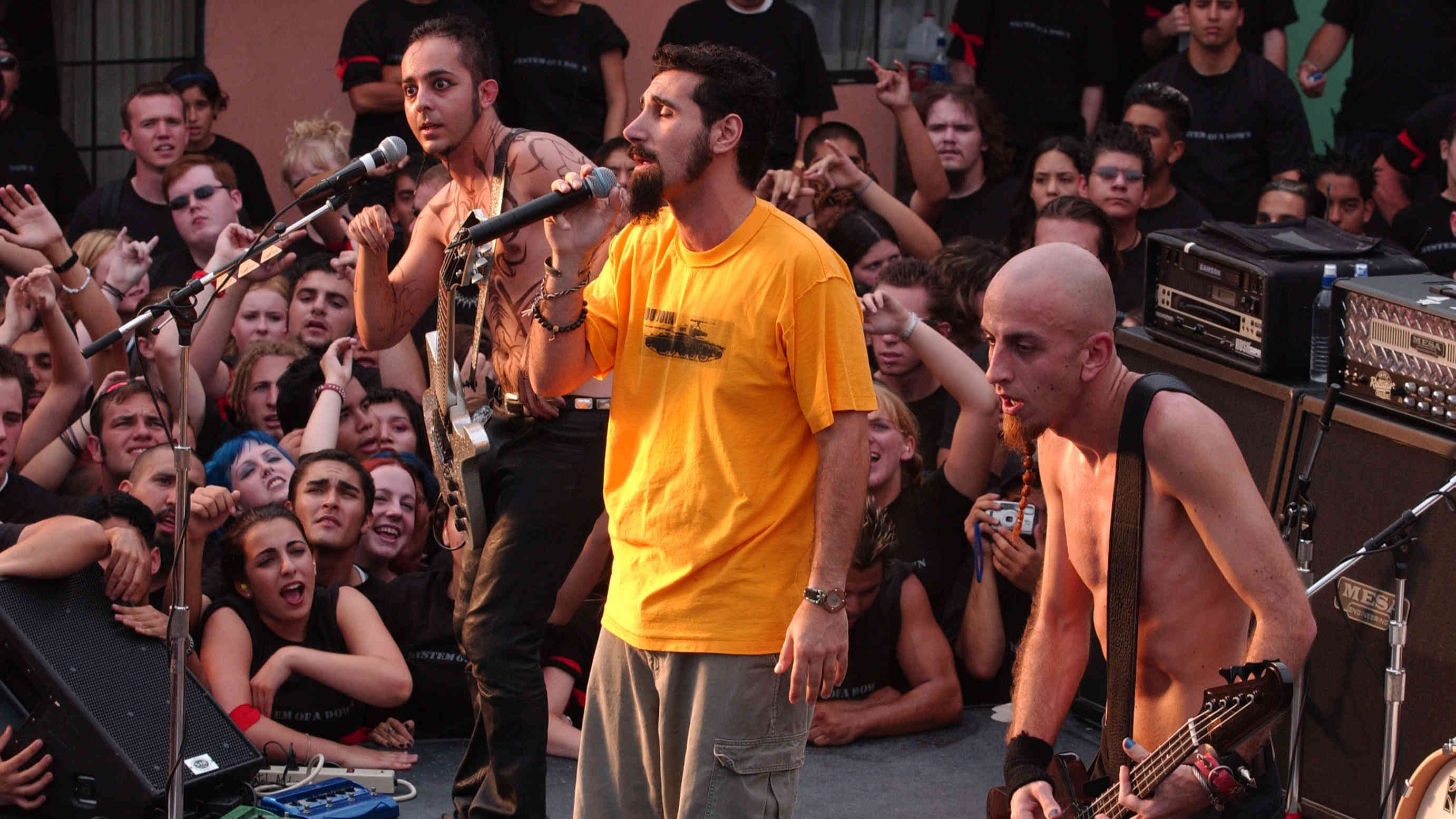
System Of A Down’s second album, 2001’s Toxicity, turned them into one of America’s biggest – and most inventive – metal bands. As the band prepared to release the album, Metal Hammer joined them in their hometown of Los Angeles to get the story behind the album that would usher metal into the 21st century.
They do things differently in California, they really do. Example: if you’re in a band, you’ll know what rehearsal rooms are like. Pokey, damp, ill-fitted with potentially lethal equipment – generally squalid little cubbyholes where everything sounds like shit unless you turn it up to eek levels. System Of A Down’s rehearsal room – called ‘The Alley’ and located on a particularly anonymous low-rent hippiefied corner of North Hollywood – is a little different. Maybe it’s the rainforest vibe you get as you walk in. Or the walls plastered with expensive-looking rock’n’roll arcana. Or the elephant tusk that passes for a door handle. Or the oak panelling and the Harley garage next door, and the boxes of spanking-new gear, and the fact it actually feels like somewhere you want to stay for longer than necessary.
The four charming lunatics who make up SOAD gradually filter in. Exchanging backslaps and dope pipes with their road crew for their first rehearsal since recording their second album Toxicity, you can sense a tangible anticipation floating around the air-con that the muso-environs only stoke further. It’s hard to get to grips with the sense of impending explosion – SOAD are a band for whom clearly everything is happening. The CD sampler of Toxicity has been spot-welded to my Walkman for the last week. The first album still tears my face off every time I’ve let it out of its cage in the last three years – it’s easy to forget what a bomb System Of A Down was. And it’s gonna be impossible to deny just what a hole Toxicity is gonna blow in the fabric of rock in 2001. Simply put, System Of A Down are too damn good to be successful, aren’t they? Aren’t they?
“Apparently not,” grins Serj Tankian, System’s softly spoken vocalist. “The first album never sold, like, one million overnight, had no single on it and it never really got much airplay. But it’s sold steadily [nearly 900,000 at the time of writing] as people have found out about us. It’s nice to know that people are into us for the music and not because we’re on TV 24 hours a day.”
Guitarist Daron Malakian has his own theory. “At the time the album came out, there wasn’t the interest in heavy music there is right now, but we’ve sort of come in under people’s radar: we get recommended to people by word of mouth and not necessarily even metal fans. I don’t know who the fuck is still buying the album right now, but people are – usually people who also buy all kinds of other music as well. And that makes me optimistic that we’re not too good to be successful. There are plenty of people who still listen to music without prejudice who have got into the band.”
Shavo Odadjian, the bass goon with a smile that’s offensively charming, also pipes up. “The first album, we came in, we plugged in and played. I think that’s what slowly got to people, the fact this wasn’t just another over-produced, over-long LA rock album. But if we’d all got our ideas out on that first album, we’d have nowhere to go after that. That’s why Toxicity has been such a total pleasure to make. And that’s why it’s gonna surprise a lot of people ’cos it’s just way beyond the first album.”
“Second albums are what bands live or die on,” says System’s hyper-kinetic drummer, John Dolmayan. “Toxicity is the next step but we still love listening to the first album. It really captures how pissed off we were at the time and how long we’d waited to be heard. So inevitably it was all just snarling shit. On this album we had time to growl before screaming.”

You get this a lot with System. What you just read is only a shadow of the way they actually speak. As you chat with all four of them upstairs in The Alley’s chill-out room, you’re floundering in search of a whip and a chair. Talking over each other in sheer enthusiasm, ripping the piss out of anything particularly earnest, suffused with in-joke cruelty and occasional lucidity, a System conversation is more like a battle of wits. It’s shot through with an aggressive desire to leave nothing out; clearly no one in the band is the ‘leader’, least of all Serj, who seems content to let the other guys thrash things out. There’s a special, almost fraternal fidelity they have with each other that keeps their relationship on the same free-speaking open ground you sense they’ve had between them all their lives. But have those relationships with each other changed in the past three years?
“Totally,” says John. “When you’ve got any group of people confined to each other’s company for three years on tour, you really do find out about those people, maybe shit you don’t wanna know, maybe shit that casts them in a whole new light. We all know that there’s nothing we can hide from each other any more, ’cos we’ve all seen how low and high we can go.”
“We’ve fought,” admits Daron. “We’ve really fought. In one day something can blow up into a full-scale war. There’s been days where he’s quit the band, he’s quit the band, he’s quit the band, I’ve quit the band. It was inevitable that touring for as long as we have would strain relationships to the limit but at the same time it’s totally strengthened them.”
“We feel like brothers now, like a family,” says Shavo. “It’s like if you fuck up with everyone else, you’ve always got your family – you don’t choose them. That’s how it is with this band. Even now, sitting here doing this interview, I feel this strength between us. I feel like, ‘Hey, we’re System.’ And we can rip each other apart but if anyone from outside the band tries it, they’ll have to deal with all of us. That really grew from being together so much and being at the point of breaking it all up so often. You realise what you’d lose and it makes the bond that much more powerful.”
Daron adds: “It should mean that we’re less intense about our music, more comfortable. If anything we feel more passionate now, even more sure that what we’re doing is right, even more determined to stay true to our own agenda and no one else’s. People have put that gang shit on us before, made us out to be some Armenian fucking militia. That’s just pure racism, but the fact we’re all Armenian makes us feel like it’s us against the world, makes us feel like we belong together.”
Ah yes, one of the more repellent strains of critical laziness rears its ugly head. Since System formed in the mid-90s – and even through their signing with Rick Rubin’s Def American in ’97 – they’ve had to put up with a wearisome, head-patting, patronising attitude about the fact that they all come from Armenian backgrounds, even being called ‘Armenian rock’ (whatever the fuck that means).
“What does it mean?” splutters Daron. “Are we playing Armenian music? No! Are we singing constantly about being Armenian? No! Does it just mean that certain people are so small-minded, so pathetically bigoted that the fact we come from a different racial background means we have fucking novelty value? Yes! Jesus!”
Shavo adds: “We know what being Armenian means to us. It means a certain upbringing, it means the fact that three of us went to the same school, it means we have roots we’re proud of and our roots will always influence us in a million subtle ways. But to just slap a label on us like that shows that no one really knows where to put us.”
“So they rely on what’s immediately obvious, like it’s a marketing tool or something,” spits John. “That’s selling us and our community short.”
“It’s basically trying to limit what we can do and say,” sighs Serj. “Whereas, if anything, I think coming from where we do, having to fight the battles we’ve had to fight because of it, has actually made us a lot more able to see things clearly than bands who are more easily assimilated into the music scene.”
Indeed. Where so many US bands have tried to mine the received cool of an anti-authority shtick (while playing on and celebrating precisely the worst traits of US triumphalism), System’s political bite seems genuinely informed by an ausländer objectivity you can’t sketch out over a few power breakfasts. For example, System recently played a benefit to raise $20,000 for the Armenian National Committee of America (ANCA). It’s an organisation that supports legislation in US Congress to officially recognise the Armenian Genocide, the first genocide of the 20th century, committed by an as-yet unrepentant Turkish government – a government the United States continues to support.
On wax, System deal with the political paradoxes and paranoia currently stifling change all over the world with a lethal accuracy and ferocious intelligence you haven’t heard since the Dead Kennedys. For Daron, the political scope of System’s music is crucial yet not all-defining.
“Politics is part of life so we reflect that. So are personal relationships, history, love, dope, anger, kindness, society, your family, your body, everything. We’d be lying if we left politics out; we’d also be lying if we let it dominate. But it doesn’t – it’s just part of what we do ’cos what we’re doing is no less than expressing who we are, what we are, what we want. And that’s an infinitely complex thing, of which politics is an essential part, but only a part of the full picture.”
Shavo explains: “I think it’s just another thing for people to concentrate on, to make things easier to deal with. And it’s linked in with the fact we’re Armenian: ‘Oh yeah, they’re pissed off about something, they’re foreign, blah, blah.’ People in the industry really can’t deal with the fact that we’re everything – they want us to just be one thing, fill one niche they can easily mark off. Fuck that. We’re not afraid to talk about politics or anything else so long as it’s honest to who we are.”
Spot on, and it’s here where you really start tapping into what makes System so damn scarily promising right now; what makes Toxicity such a mind-blowing detonation of not just their own blueprint but everyone else’s as well. The band they remind us most of, the band whose demented reach that Toxicity so eerily recalls, is Jane’s Addiction. Not just ’cos like them, they seem to encompass all of LA’s contradictions, it’s magic and malaise, it’s freedom and it’s slow, lingering death. And not because they sound anything like Farrell’s freakshow. It’s because, like Jane’s, they’re a band who unmistakably want to take on the whole world, a band totally resistant – not just in attitude but in word and deed – to rock’s current settling pattern, music’s unfathomable willingness to be crow-barred onto a shelf it can call home. Like Jane’s, System are definitive of their time and yet somehow beyond it, intent on being shamanic, spiritual, political, personal and, fundamentally, as suggestively complex as human life is.

“When we were recording Toxicity, we threw everything in, musically as well,” says Daron. “There’s all sorts of influences that might surprise a lot of people and there’s a battle of sounds that really reflects who we are as people, how fucked up and wide our tastes are. We’ve opened each other up to different kinds of music and we threw out any kind of bullshit dictas-of-cool when we wrong the songs.”
“Even fucking Morrissey, who I thought was the Antichrist, has found his way into our sound!” reveals Shavo. “I never thought I’d see the fucking day…”
“Says the guy into fucking techno!” says Serj. “And he’s calling The Smiths fucking soft music!”
And they’re off again. And from this ruckus has come an album of the year. Time to see it in action.
System plug in and play. Except they don’t. First they bicker about setlists. Then they bicker about the sound set-up. At no point do you ever get the feeling they’re being serious, just that this is how they function – with honesty at all times, with none of the power games and mind trips most bands parry around. And then Daron starts playing guitar and planets start bouncing around the room.
‘Terrifyingly good’ is the only way to describe what we witness. They open with a long, loose-limbed jam that tears down tangents of almost Middle Eastern abstractions, then pile into faves like DDevil and Sugar with a locked-down vibe that belies the fact that this is their first rehearsal in months. SOAD are even more staggering when whipping up the textural firestorms of the new songs. There’s Prison Song’s pummelling drive, Needles’ feral fractiousness, the strung-out epic feel of Chop Suey! and Forest. This close up, you can see clearly how the dynamics of personality and music work in this band.
Daron paints the ceiling; huge welters of wah-wah feedback and fat blasts of chrome. Shavo propels things into funk, dub, hardcore, math-rock geometry – anywhere the song demands. John keeps the centre, the pulse from which everyone else can derail, and over it all are Serj’s freewheeling vocals. Slipping from heartbreaking croon to street-corner loon in a syllable, he breaks syntax apart into demented mutterings, possessed howls, a flood of lyrical and vocal ticks like a muezzin with Tourette’s. It’s a vocal anti-style closer to free jazz than metal, suggesting that while Serj admits he’s the most musically unschooled in the band, he’s the variable that really spins System away from the predictable, marking them out as something truly unique.
Listening to the glorious wreckage that is SOAD at full tilt right now, you have to ask one thing: how the fuck did they end up sounding like this? “By going our own way,” John reveals. “Sounds easy, but in a town so fucking up its own ass as LA, it’s something you really have to be dedicated to.”
Daron adds: “It’s interesting what you said about LA earlier and about Jane’s Addiction, ’cos that’s a band we’d love to be compared to. Every other band we get compared to, I just don’t get it. I always just think, ‘Yeah, but we’re different to them in this way…’ We’re really dimly aware of what’s happened in the last few years with metal getting so successful. It just seems that, like anything else, it’s all about the lowest common denominators and simplifying shit to stay on the right side of your record company. It’s not just that we won’t do that – we can’t do that ’cos we got so much shit when we were starting off, we’re never gonna listen to it ever again now we’ve sort of made it.”
What kind of thing?
“Don’t growl if you want to be signed. That was a good one. We used to get told that all the time. Don’t change the tempo in a song. Don’t sing about specific subjects. Don’t go on stage without a ballad up your sleeve. All this bullshit advice for so long. Growing up Armenian in LA is a good lesson in never being taken seriously, being condescended to when you’re not encountering outright hostility.”
“We’ve transcended all of that already,” Serj reckons. “But Toxicity is something else again. If we confused people initially, we’re really gonna screw with them this time.”
“After a while you realise that the truth of what we do isn’t about this,” says Shavo. “It isn’t about interviews or parties. It’s about that half hour on stage. Nothing feels like it, nothing in real life comes close to it, and we’re all trying to achieve it every time.”
Daron explains: “For me, what’s important about Toxicity is that it’s about 40 minutes long.”
Why’s that crucial?
“Because it fits on one side of a tape. Because you don’t get half way through and get bored. Because you don’t get bored. Because it’s not indulgent, it’s a whole piece, it’s concise, it’s thought about, not just shat out. I’m sick of musicians thinking they can just cock a leg and shoot out genius. We owe it to the music that influenced us to try and be that clear, that precise, that committed. And can I get back to my guitar now? It’s calling me.”
He’s practically frothing at the gob. You’ll be frothing at quite a different orifice when Toxicity seeps into your life. SOAD are a band to feel righteous, obsessed, evangelical about, after way too long feeling evangelised at. Believe.
Originally published in Metal Hammer in September 2001







